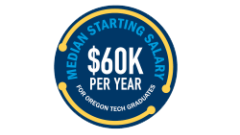Program Mission
The mission of the Bachelor of Science in Data Science program at the Oregon Institute of Technology is to prepare students for professional practice or graduate school. A graduate will be prepared with the technical skills necessary to gain actionable insights from data, the ability to effectively communicate these insights as a member of an interdisciplinary team, and the necessary foundation in ethics, mathematics, and computer science to thrive in the evolving field of data science.
Graduates are expected to be able to function as an independent data scientist at moderate-sized companies or as a member of an analytics team at larger corporations. Professionally, this program will set graduates up to be life-long learners within the field of data science and data-supported decision making which will allow them to gradually branch into management positions or graduate school as their career progresses.
Educational Objectives
Graduates of the program will be able to:
- Translate a real-world question into mathematical language. The ability to transform a real-world problem into a strategy and metric for comparison and improvement is a critical tool for any data scientist. Direct measures of this may include the identification of a loss function which is dependent on the structure of the response variable and methodology of estimation or classification. Indirect measures will include client feedback and successful job placement as this is a standard question in all interviews for this field.
- Design an efficient and cost-effective data collection strategy. Big data storage and retrieval are costly in terms of both storage and processing time for both upload/download and structure processing. An efficient management of data “collection” (both from a storage and retrieval) perspective is a requirement for any data science project. Direct measures of this include assessment of database design and algorithm efficiency as assessed by projects within the coursework. Indirect measures may be obtained by considering client opinions on projects and similar input.
- Apply ethical standards necessary in data collection, analysis, and storage. Ethics of practice are considered in all stages of the data science workflow from data collection and storage to presentation. Direct measures of ethical standards will include specific scenario-based questions and student responses to exam and assignment questions. Employer-specific questionnaires and client feedback would be necessary in order to assess ethical practice.
- Construct a reproducible workflow with project documentation. Reproducible workflow and documentation allows for others to read a data scientist's work and verify assumptions and methodology. It is part of ethics and professionalism. Direct assessment of this can be observed through project documentation.
- Design, create and manage data storage framework. Database and flat file storage of data keep a workflow consistent, cost-effective, and reproducible. Measurement of a student’s understanding and ability can be directly measured from student projects and course grades.
- Clean, impute, and structure features for modeling data. Direct measures of a student’s ability to clean, impute, and structure data can be taken from class assignments.
- Produce sophisticated visualizations and quantitative summaries of data.
- Identify and quantify correlations and causal relations within a dataset.
- Optimize and validate predictive analytics.
- Effectively synthesize and communicate findings in written and oral reports.
- Work effectively as a member of diverse teams.
Program Student Learning Outcomes
Graduates will:
- Be prepared for the professional practice of data science or acceptance into a graduate program.
- Have an appropriate foundation in mathematics, statistics, and computer science in order to thrive in an evolving field.
- Be able to identify and incorporate ethical considerations in their work.
- Be able to identify, collect and analyze the data necessary for actionable insights.
- Be able to effectively communicate findings.
Summary of Program Student Learning Outcomes
The Mathematics faculty formally assess the student learning outcomes summarized in the annual program assessment report. Additional details can be found in department assessment records.






